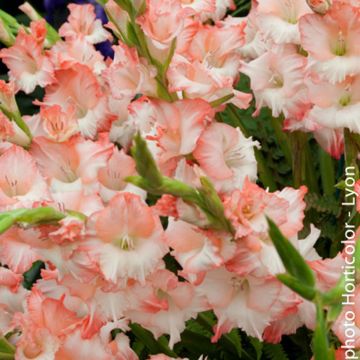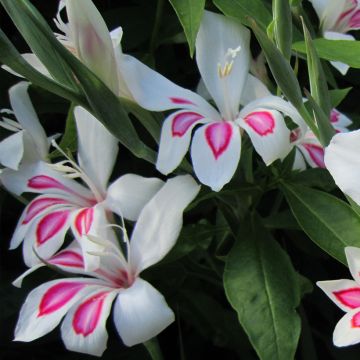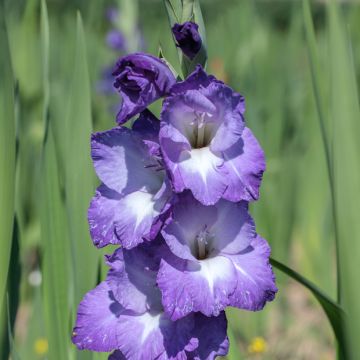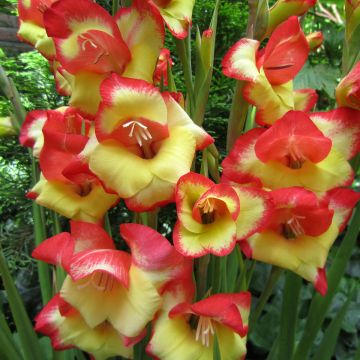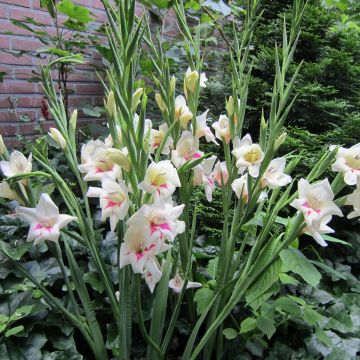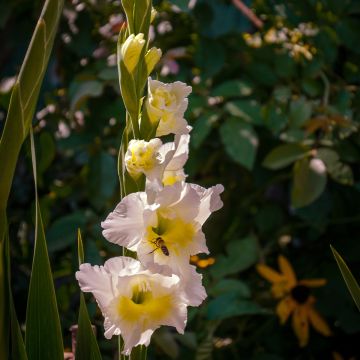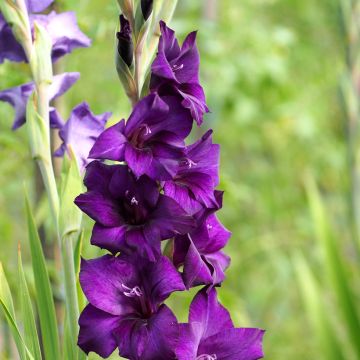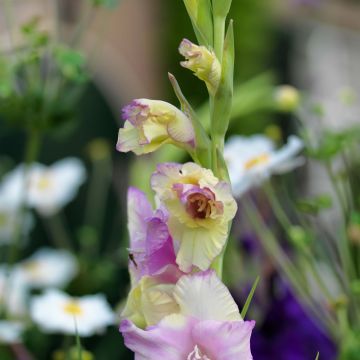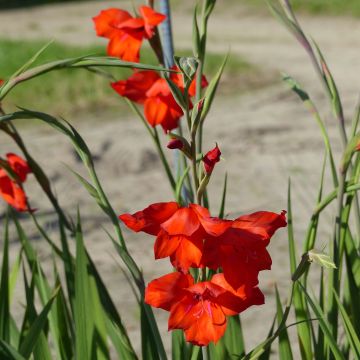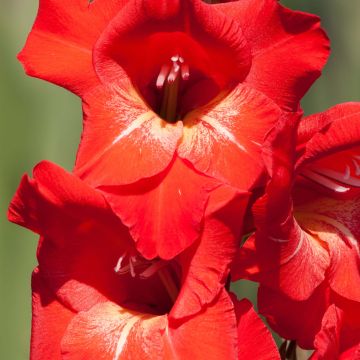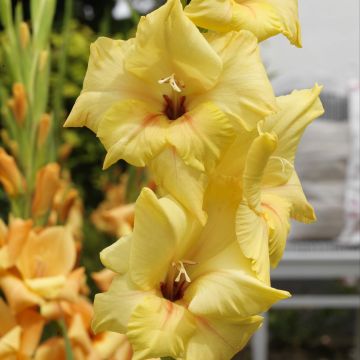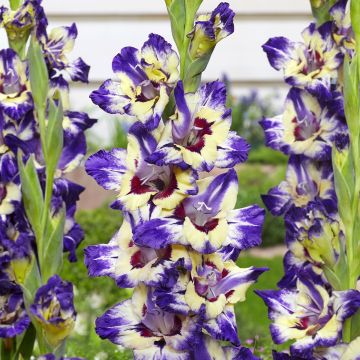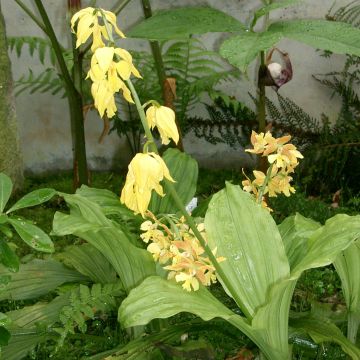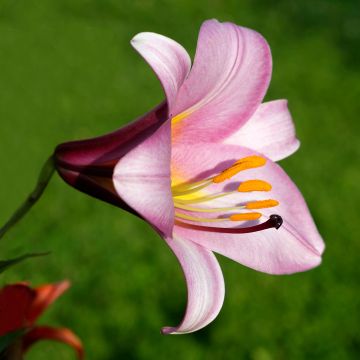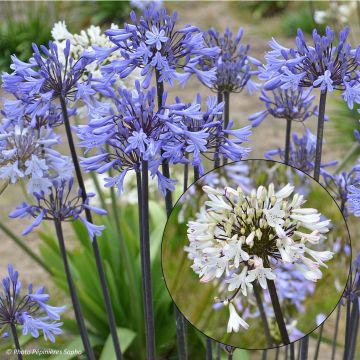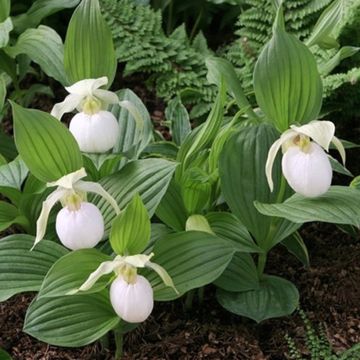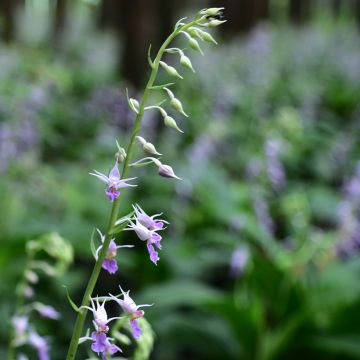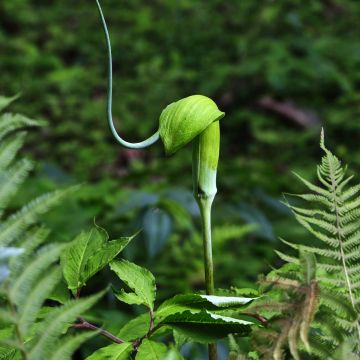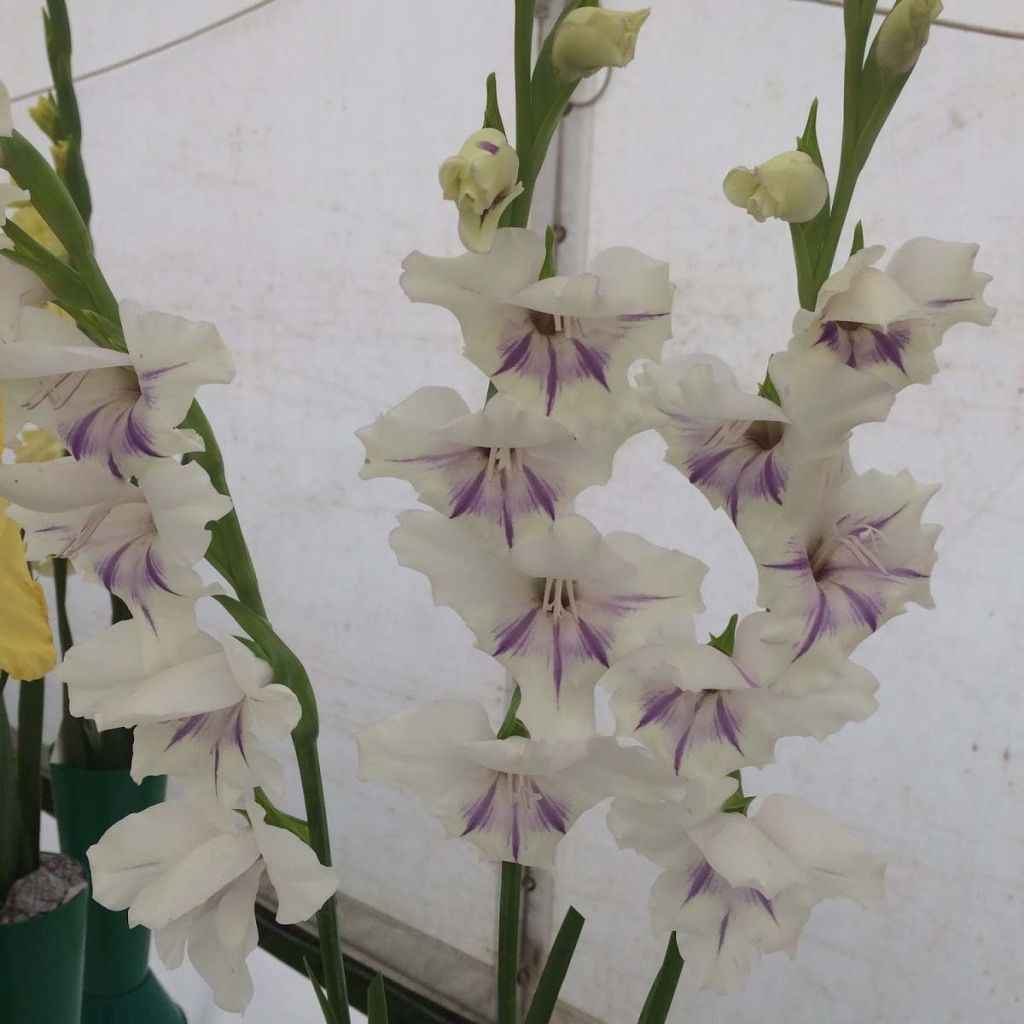

Gladiolus primulinus Angel Kisses - Sword Lily
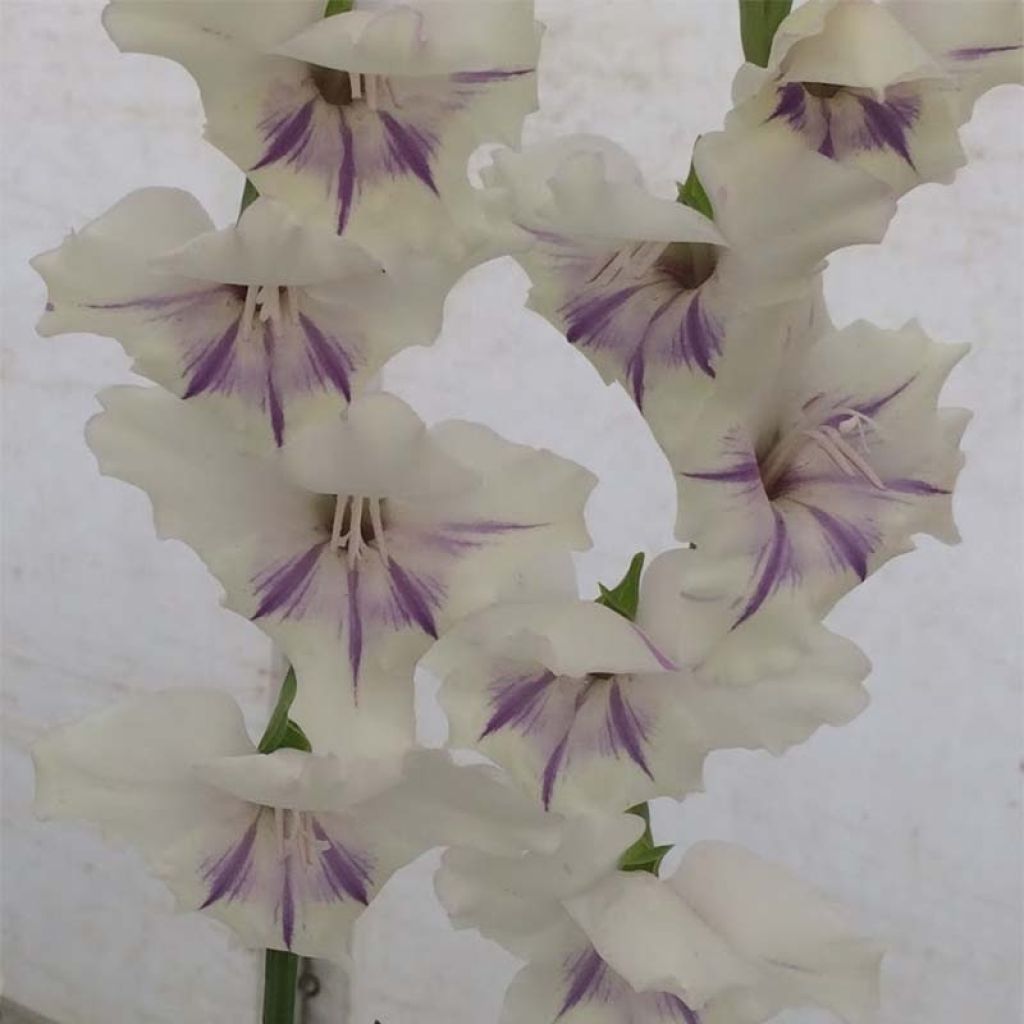

Gladiolus primulinus Angel Kisses - Sword Lily
Gladiolus primulinus Angel Kisses - Sword Lily
Gladiolus primulinus Angel Kisses
Sword Lily, Primrose Gladiolus
Why not try an alternative variety in stock?
View all →This plant carries a 6 months recovery warranty
More information
We guarantee the quality of our plants for a full growing cycle, and will replace at our expense any plant that fails to recover under normal climatic and planting conditions.
From €5.90 for pickup delivery and €6.90 for home delivery
Express home delivery from €8.90.
Does this plant fit my garden?
Set up your Plantfit profile →
Description
The Gladiolus 'Angel Kisses' is a relatively small-sized variety of gladiolus, with elegant flowers and delicate lines, whose hardiness allows for year-round cultivation in open ground in mostcontinental european climates, provided it is well mulched in winter. This bulb produces, from late spring to the heart of summer depending on the climate, well-filled spikes of white flowers adorned with purple signals on the throat. A hybrid that is not widely planted in gardens, but has a great chance of changing the perception of detractors who often consider this plant too stiff and artificial-looking. Elegant, natural, and graceful, it integrates much better than large hybrids into romantic or slightly wild flower beds.
The genus Gladiolus belongs to the family of irises, the cultivated varieties are hybrids divided into 3 major groups: Grandiflorus (large-flowered), Primulinus (early), and Nanus (butterflies). 'Angel Kisses' belongs to the Primulinus group, characterized by rather small and often maculate flowers, irregularly arranged on stems 60 to 70 cm (24 to 28in) high, each bearing up to 20 florets. The upper petal of each flower has a curving helmet shape.
'Angel Kisses' is an original and very recent cultivar, still very rare in cultivation. It is a perennial herbaceous plant, with thin sword-shaped leaves arranged in a fan shape, forming a clump about 70-80 cm (28-32in) high when in bloom. The leaves are topped by an inflorescence in spike form, with at least ten buds, whose flowers resemble those of certain orchids, carried by very slender, upright stems. Here, they are a pale mauve-washed white, with each petal outlined in violet. The reserve organ is a corm, which is a swollen stem covered with scales. Each corm will produce 2 or 3 flowering stems.
Gladioli and their long colourful spikes are symbolic of the 1970s and somewhat formal floral arrangements. While they are irreplaceable in bouquets, in gardens, their silhouette needs the presence of plants with lush foliage that will enhance their abundant, yet wildly romantic, flowering. Plant 'Angel Kisses', elegant and radiant, among grasses in the company of forget-me-nots and mignonette, for example, so as not to overshadow it. Play with the white of certain alstroemerias or columbines, for elegance, and add here and there a silvery foliage of artemisia or Stachys lanata. Gladioli are frequent visitors to cottage gardens, where they even accompany vegetables in the vegetable patch. For making bouquets, cut the flowering spikes when the first floret starts to open. Plant them at intervals of two weeks from early spring until the end of June to enjoy their blooms in the house and garden all summer long.
The gladiolus gets its name from the shape of its sword-like leaves, derived from the Latin word "gladius". Its wild forms were often depicted in jewelry or on tapestries and fabrics made by the Semites before the Christian era.
Report an error about the product description
Gladiolus primulinus Angel Kisses - Sword Lily in pictures
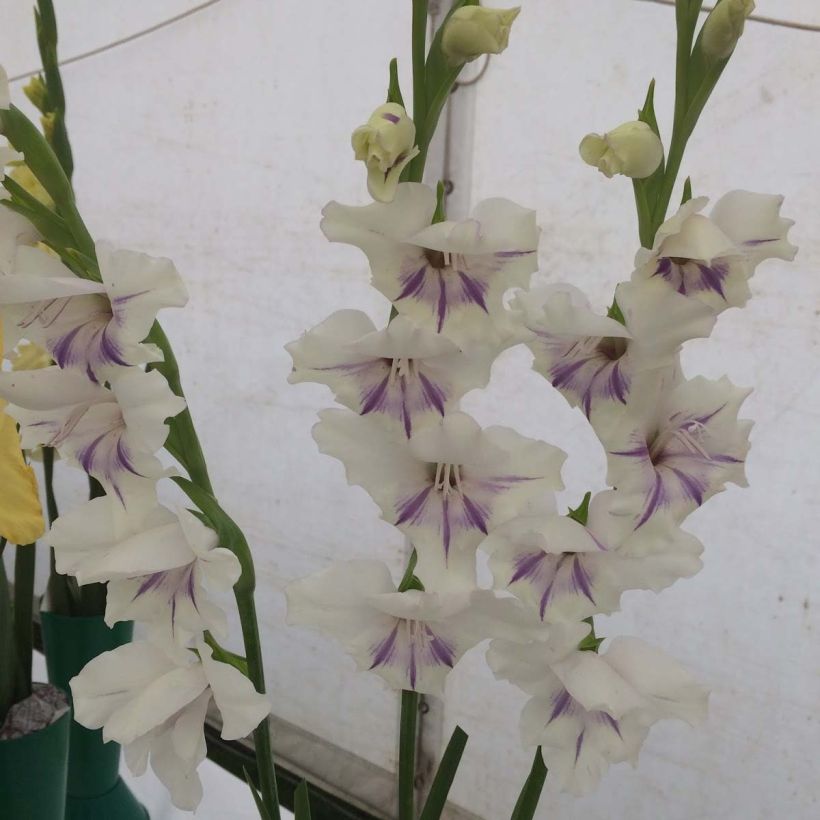



Plant habit
Flowering
Foliage
Botanical data
Gladiolus
primulinus
Angel Kisses
Iridaceae
Sword Lily, Primrose Gladiolus
Cultivar or hybrid
Other Gladioli
Planting and care
The 'Angel Kisses' Gladiolus loves rich, fertile but well-drained soils, so sandy soils are preferred and compact clay should be avoided. Plant it in full sun. Space the bulbs 10 to 15cm (4 to 6in) apart and cover them with 10cm (4in) of soil. Avoid using manure to fertilise the soil, as it promotes bulb rot. Gladiolus are susceptible to frost, so they should be dug up when they have withered or immediately after the first frost. Cut the leaves and let them dry in a well-ventilated place for three weeks. Separate the old bulbs, store the new bulbs and bulblets throughout the winter in a cool place, protected from frost. The bulblets will flower in two years. It is best not to plant Gladiolus bulbs in the same spot for several years in a row. An annual rotation will yield better results. In mild climates, corms can be planted in September-October and left in the ground over winter without damage.
Planting period
Intended location
Care
This item has not been reviewed yet - be the first to leave a review about it.
Hardy summer bulbs
Haven't found what you were looking for?
Hardiness is the lowest winter temperature a plant can endure without suffering serious damage or even dying. However, hardiness is affected by location (a sheltered area, such as a patio), protection (winter cover) and soil type (hardiness is improved by well-drained soil).

Photo Sharing Terms & Conditions
In order to encourage gardeners to interact and share their experiences, Promesse de fleurs offers various media enabling content to be uploaded onto its Site - in particular via the ‘Photo sharing’ module.
The User agrees to refrain from:
- Posting any content that is illegal, prejudicial, insulting, racist, inciteful to hatred, revisionist, contrary to public decency, that infringes on privacy or on the privacy rights of third parties, in particular the publicity rights of persons and goods, intellectual property rights, or the right to privacy.
- Submitting content on behalf of a third party;
- Impersonate the identity of a third party and/or publish any personal information about a third party;
In general, the User undertakes to refrain from any unethical behaviour.
All Content (in particular text, comments, files, images, photos, videos, creative works, etc.), which may be subject to property or intellectual property rights, image or other private rights, shall remain the property of the User, subject to the limited rights granted by the terms of the licence granted by Promesse de fleurs as stated below. Users are at liberty to publish or not to publish such Content on the Site, notably via the ‘Photo Sharing’ facility, and accept that this Content shall be made public and freely accessible, notably on the Internet.
Users further acknowledge, undertake to have ,and guarantee that they hold all necessary rights and permissions to publish such material on the Site, in particular with regard to the legislation in force pertaining to any privacy, property, intellectual property, image, or contractual rights, or rights of any other nature. By publishing such Content on the Site, Users acknowledge accepting full liability as publishers of the Content within the meaning of the law, and grant Promesse de fleurs, free of charge, an inclusive, worldwide licence for the said Content for the entire duration of its publication, including all reproduction, representation, up/downloading, displaying, performing, transmission, and storage rights.
Users also grant permission for their name to be linked to the Content and accept that this link may not always be made available.
By engaging in posting material, Users consent to their Content becoming automatically accessible on the Internet, in particular on other sites and/or blogs and/or web pages of the Promesse de fleurs site, including in particular social pages and the Promesse de fleurs catalogue.
Users may secure the removal of entrusted content free of charge by issuing a simple request via our contact form.
The flowering period indicated on our website applies to countries and regions located in USDA zone 8 (France, the United Kingdom, Ireland, the Netherlands, etc.)
It will vary according to where you live:
- In zones 9 to 10 (Italy, Spain, Greece, etc.), flowering will occur about 2 to 4 weeks earlier.
- In zones 6 to 7 (Germany, Poland, Slovenia, and lower mountainous regions), flowering will be delayed by 2 to 3 weeks.
- In zone 5 (Central Europe, Scandinavia), blooming will be delayed by 3 to 5 weeks.
In temperate climates, pruning of spring-flowering shrubs (forsythia, spireas, etc.) should be done just after flowering.
Pruning of summer-flowering shrubs (Indian Lilac, Perovskia, etc.) can be done in winter or spring.
In cold regions as well as with frost-sensitive plants, avoid pruning too early when severe frosts may still occur.
The planting period indicated on our website applies to countries and regions located in USDA zone 8 (France, United Kingdom, Ireland, Netherlands).
It will vary according to where you live:
- In Mediterranean zones (Marseille, Madrid, Milan, etc.), autumn and winter are the best planting periods.
- In continental zones (Strasbourg, Munich, Vienna, etc.), delay planting by 2 to 3 weeks in spring and bring it forward by 2 to 4 weeks in autumn.
- In mountainous regions (the Alps, Pyrenees, Carpathians, etc.), it is best to plant in late spring (May-June) or late summer (August-September).
The harvesting period indicated on our website applies to countries and regions in USDA zone 8 (France, England, Ireland, the Netherlands).
In colder areas (Scandinavia, Poland, Austria...) fruit and vegetable harvests are likely to be delayed by 3-4 weeks.
In warmer areas (Italy, Spain, Greece, etc.), harvesting will probably take place earlier, depending on weather conditions.
The sowing periods indicated on our website apply to countries and regions within USDA Zone 8 (France, UK, Ireland, Netherlands).
In colder areas (Scandinavia, Poland, Austria...), delay any outdoor sowing by 3-4 weeks, or sow under glass.
In warmer climes (Italy, Spain, Greece, etc.), bring outdoor sowing forward by a few weeks.

































